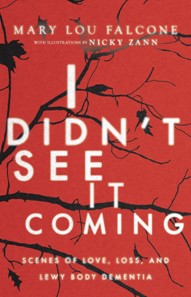Industry News
Noted Industry Publicist Advocates for Awareness of LBD
 Over the last 50 years as a public relations professional in the music business, people have asked me, “When are you going to write THE BOOK?” My answer remained consistent, “NEVER!”
Over the last 50 years as a public relations professional in the music business, people have asked me, “When are you going to write THE BOOK?” My answer remained consistent, “NEVER!”
Lesson learned: never say never, because now I have written I DIDN’T SEE IT COMING: Scenes of Love, Loss, and Lewy Body Dementia, published by East End Press. It’s actually a love story, a cathartic journey filled with hope, laughter, and tears.
Why did I finally break my silence? Because my beloved husband/soulmate of 37 years, Nicky Zann, whom many of my colleagues knew, was diagnosed with and ultimately died from Lewy body dementia (LBD) in 2020. A few months before he passed, Nicky in a lucid moment said, “You have to write.” I remember thinking, “Write what?” And then I knew…after several frustrating years searching for answers about LBD to help Nicky, it became clear that what I learned about the disease and about myself in the process needed to be shared.
Lewy body dementia (LBD) is not rare. It’s the second most common form of progressive dementia after Alzheimer’s disease, affecting 1.4 million Americans, and yet most people have never heard of it: hence the frequently asked questions, “Lewy what?” and “How do you spell that?” LBD is widely misdiagnosed, as it can mimic Alzheimer’s disease, Parkinson’s disease, or a psychiatric disorder. Here are some facts:
- More people have LBD than ALS, muscular dystrophy, and cerebral palsy combined.
- LBD is a neurodegenerative brain disease (affecting thinking, memory, and movement) in which one size does not fit all, making it hard to diagnose. Once diagnosed, it is difficult to treat and, currently, impossible to cure.
- The most familiar name linked to LBD is Robin Williams, but even he was misdiagnosed and never knew what he had; LBD was discovered in autopsy.
LBD vs. ME
Equipped with these devasting facts, I committed to sharing them and much more. I labored day and night for months, creating what felt like a decent manuscript. “Not so fast,” said my publisher, as she read through my early draft about being Nicky’s sole caregiver and the roller coaster ride we had shared. She felt the narrative needed more of my personal backstory. “If we don’t care about you, we will never care about Lewy body dementia,” said my very wise editor. The whole idea of writing more about myself and baring my soul had always been loathsome to me. But I knew she was right…I had to do it.
As I went back to the drawing board, I realized that whatever my life might have looked like from the outside, I am and always have been a caregiver. It began at age ten, when my father suffered a massive stroke; he survived it, but never spoke again. As a publicist, speaking for and about artists over the years is a form of caregiving.
But the ultimate caregiving challenge came during the pandemic when Nicky was dying. Throughout our journey together, I relied on communication and compassion, tapping into this innate talent first realized as a child in the 1950s, when singing enabled me to share emotions and still not violate the code of the time, of keeping “family business” private. Singing also set me on a career path; it enabled me to get into the Curtis Institute of Music, which prepared me for life as a professional musician—a pursuit, I came to realize, that would require self-sufficiency, self-motivation, and self-awareness. This last was especially important; after about eight years of extraordinary performing opportunities, I began to see how caregiving—taking care of the careers of others—was a more natural fit for me. In 1973, I followed my instincts and opened my own public relations company. I have never looked back.
Decades ago, the late Alix Williamson, a friend and legendary publicist, said to me, “Do you ever wonder what you are going to be when you grow up?”
Over the years I’ve pondered that question, and, even as I continue to represent some of the highest profile performers in the business, including Carnegie Hall and the New York Philharmonic, I finally have the answer: My next act, with this book as the catalyst, is being a spokesperson and advocate for Lewy body dementia awareness.
When Nicky was diagnosed with LBD, he said, “We have had a great run, we cannot be sad.” Today, thanks to Nicky’s indomitable spirit that I carry with me, I am not sad, and I continue to have a great run thanks to supportive friends and colleagues in the industry.
Mary Lou Falcone is internationally known as a classical music publicist/strategist who for 50 years has helped guide the careers of celebrated artists—Van Cliburn, Gustavo Dudamel, Renée Fleming, Sir Georg Solti, James Taylor—and advised many institutions from Carnegie Hall to the Vienna Philharmonic. Her late husband, the illustrator Nicky Zann, was the catalyst for this, her first book.





 FEATURED JOBS
FEATURED JOBS

 RENT A PHOTO
RENT A PHOTO


